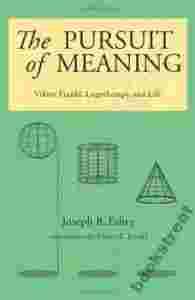|
Edited and typeset, this is largely a reprint of
the 1987 classic. Contains the essence of the
logotherapeutic writings of Viktor Frankl, who noted
that many readers report that they understand some parts
of logotherapy for the first time after reading this
book. Fabry wrote in the introduction: Many older
therapies place responsibility for our difficulties on
our early upbringing. Logotherapy is "education to
responsibility." Outside influences are important but
not all-determining. Within limitations we have a say
about who we are and who we want to become. We need
never let ourselves be reduced to helpless victims.
Consequently, logotherapy-unlike therapies that aim at
equilibrium by adjusting patients to society-does not
see a tensionless life as a therapeutic goal. Tension is
part of living as a human being in a human society. To
remain healthy, the unhealthy tensions of body and
psyche are to be avoided. But the healthy tension of the
spirit strengthens our spiritual muscles. The healthiest
tension is between what we are and what we have the
vision of growing toward, or, to use Frankl's favorite
phrase, "the tension between being and meaning"
(Psychotherapy and Existentialism, p. 10). The struggle
for meaning is not easy. Life does not owe us pleasure;
it does offer us meaning. Mental health does not come to
those who demand happiness but to those who find
meanings; to them happiness comes as a side product. "It
must ensue" noted Frankl. "It cannot be pursued"
(Unconscious God, p. 85). Logotherapy maintains and
restores mental health by providing a sound view of the
human being and the world as we know it. It draws on the
huge reservoir of health stored in our specifically
human dimension-our creativity, our capacity to love,
our reaching out to others, our desire to be useful, our
ability to orient to goals, and our will to meaning.
Logophilosophy emphasizes what is right with us, what we
like about ourselves, our accomplishments, and our peak
experiences. It also considers the qualities we dislike
so we may change them, our failures so we can learn from
them, our abysses so we may lift ourselves up, knowing
that peaks exist and can be reached.
|
|

